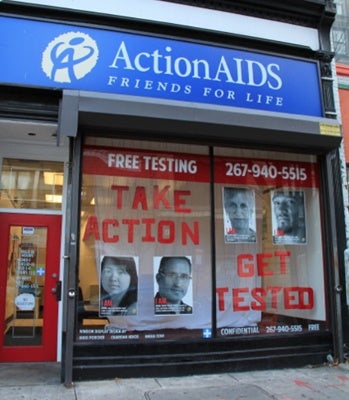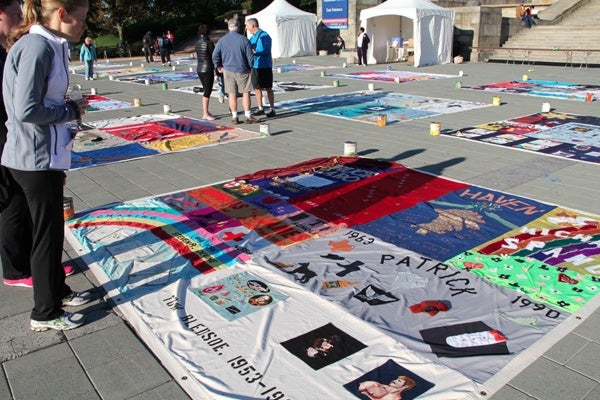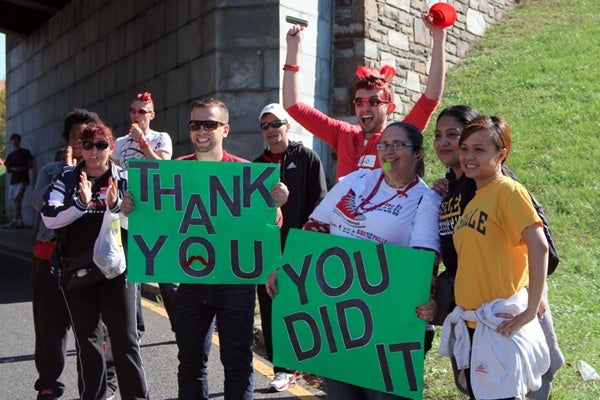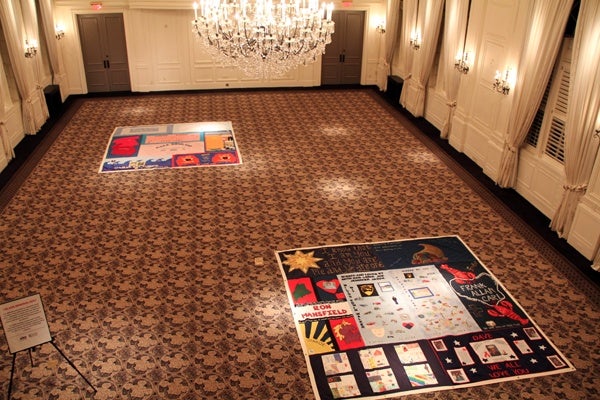Why World AIDS Day still matters
-

<p>The front window at the Center City annex of ActionAIDS encourages HIV testing year round. (Marta Rusek/for NewsWorks)</p>
-

<p>Facts about newsworthy and pop culture milestones of the AIDS epidemic stretch out at AIDS Walk Philly, Oct. 21, 2012. (Marta Rusek/for NewsWorks)</p>
-

<p>People of all ages participate in a nearly eight-mile stroll for AIDS Walk Philly on Oct. 21, 2012. (Marta Rusek/for newsWorks)</p>
-

<p>Walkers observe sections of the AIDS quilt at AIDS Walk Philly, Oct. 21, 2012. (Marta Rusek/for NewsWorks)</p>
-

<p>Cheerleaders congratulate walkers at the finish line of the Philadelphia AIDS Walk, Oct. 21, 2012. (Marta Rusek/for NewsWorks)</p>
-

<p>Portions of the Philadelphia AIDS Quilt are on display at the 25th anniversary benefit for AIDS support service provider Calcutta House, Nov. 29, 2012. (Marta Rusek/for NewsWorks)</p>
“I don’t know how kids today get HIV,” a friend and 26-year HIV survivor told me. “There’s no reason. We didn’t know a whole lot about it in the beginning. Now, you can’t pretend you don’t know. The information is everywhere.”
AIDS has been with us for over 30 years now. Perceptions of AIDS and the virus that causes it have changed drastically since the first cases surfaced in 1981. A mystery disease predominantly afflicting gay men and I.V. drug users turned into a worldwide epidemic that killed millions indiscriminately, then eventually became a chronic condition thanks to advances in anti-retroviral medications.
In the time since its devastating debut, AIDS has become well known, and well studied by scientists who still work towards a cure. So why is the number of new HIV infections in Philadelphia still on the rise?
As AIDS Fund Philly, the non-profit agency that organizes the annual AIDS Walk, points out frequently in its outreach campaigns, Philadelphia HIV infection rate is five times the national average. The situation is worse among young people ages 13 to 24.
According to statistics released by the CDC’s Division of Adolescent and School Health, over 60% of high school students in Philadelphia have had sex. And of those students, 40% did not use a condom the last time they had sexual intercourse.
It’s statistics like these that make World AIDS Day so important, to those living with the disease and more so for the eyes that can be opened by it. Since 1988, December 1 has been reserved for the red ribbon as an occasion to remember the lives lost and, more importantly, to remind everyone that AIDS is still a problem.
Encouraging behaviors that prevent HIV transmission can be a hard-won battle. We all know that flossing our teeth after every meal is important to prevent gum disease and cavities. Despite knowing the benefits of flossing, not all of us remember to do it. The same can be said for HIV prevention. Countless studies have proven that condoms are an effective way to prevent the virus from passing from one person to another. Unfortunately, sexually active men and women may forget to buy them (or get them for free from a multitude of clinics in the city), carry them, or talk about using them with their partner before engaging in risky sexual activities.
Another factor is the lack of attention, from health classes in schools to news reports on television. HIV is not the death sentence it once was, since more HIV-positive individuals are receiving treatment in the form of anti-retroviral therapy. With this success in prolonging life comes an unfortunate side effect — HIV has been reduced in many minds to just another infection. Since AIDS-related deaths are not grabbing the headlines they once were, Philadelphians (particularly the young ones) do not see the virus as a tremendous health threat.
World AIDS Day gives those of us who know or live with the virus a chance to share that knowledge with at-risk populations. My friend is right — the information on HIV is out there, but in this decade, it will take dedicated individuals teaching the young and the forgetful to drive those rates of infection down. Pastors can discuss safe sex and HIV testing from the pulpit as a means of respecting loved ones, while parents can talk to their children about sex and protection the way they talk about driving a car. When you engage in an adult activity, you must exercise responsibility in order to enjoy the journey and keep everyone involved safe.
The primary goal of World AIDS Day is to turn the newly educated into ambassadors of change in their communities. Education and prevention are powerful allies in the fight against AIDS, but it takes commitment and faith in these processes to make them work.
WHYY is your source for fact-based, in-depth journalism and information. As a nonprofit organization, we rely on financial support from readers like you. Please give today.

